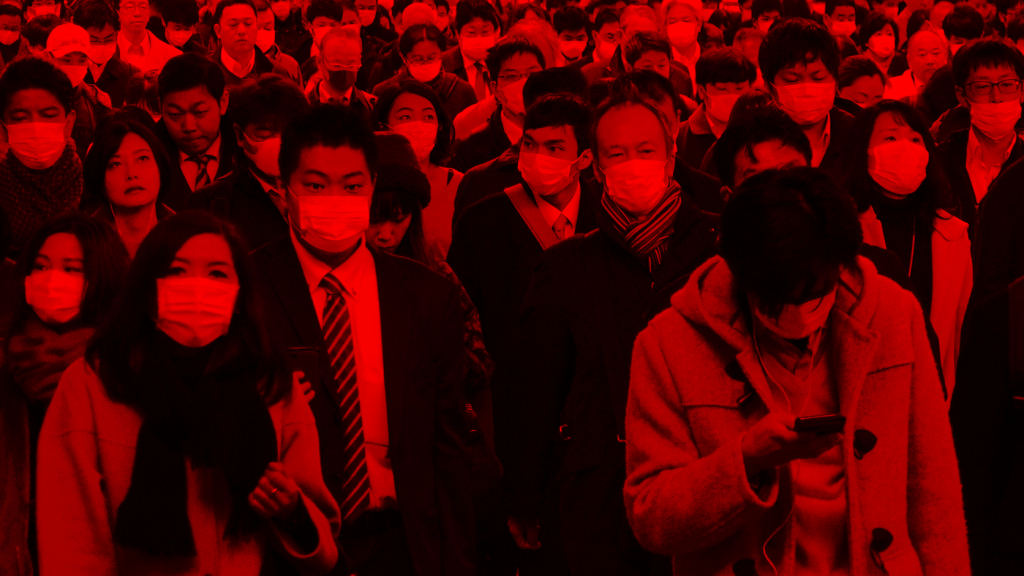In 1892, Arthur James Balfour, 1st Earl of Balfour, was quoted as having said, “there are three kinds of falsehoods, lies, damned lies and statistics.” This statement has been requoted and paraphrased over the years.
Fast forward to 2020 and what we seem to have, at least in regard to how different countries, including Japan, have handled the current contagion are “supporters, critics and statistics.” According to Twitter, every 45 milliseconds, a Covid-19-related tweet enters the global conversation, followed by a flood of support, criticism and statistics. And we are left to figure out what, amid all of this, is true or false.
Although — with the daily rate of new cases having dropped substantially relative to its peak a month ago — Japan seems to have turned a corner in terms of the virus, many commentators are unwilling to concede that the contagion is under control. Perhaps that is sensible, given how little is understood about how this virus works and the continuing concerns about a “second wave.” Certainly it behooves us all to remain cautious. The fact is, caution, and precautions, are likely to be a part of everyone’s lifestyle for the foreseeable future — a new normal, if you will.
Failures and criticism
Critics of Japan’s handling of the situation are, for the most part, critical of the government. This criticism could well explain why many won’t concede that the contagion is under control. Unusually, the criticisms are also coming from people not usually known for such behavior, including celebrities, scientists, and ordinary citizens. Perhaps Twitter deserves some of the credit.
Among the most vocal Twitter critics is former Prime Minister Naoto Kan who has accused Prime Minister Shinzo Abe of abrogating his responsibilities as the elected leader of the country by turning to medical experts as his only guides. Instead, he argues, Abe should have considered expert opinions from various sectors, amalgamating them and then making a holistic decision suitable for the entire populace. (In saying this, Kan, of course, has his own agenda of contrasting Abe’s failure to make any decision to his own bold decision to order TEPCO staff to remain at the Fukushima plant in March 2011, a decision that arguably saved Japan from becoming a nuclear wasteland.)
“Critics of Japan’s handling of the situation are, for the most part, critical of the government.”
There can be no question that the Abe government has indeed committed a number of missteps over the past few months: failing to adequately quarantine the Japanese citizens it evacuated from Wuhan early on, the woeful handling of the Diamond Princess cruise ship, failing to adopt suitable detection measures for others entering the country, the complete debacle of “Abenomask” (I still haven’t received mine; how about you?), an unfulfilled promise of increased PCR testing, and more. Predictably, Abe’s public approval rating has slipped substantially.
The contagion has also had an enormous negative impact on Japan’s feeble economy. Although one could argue that Japan is no worse, or better, off than any other country on this front — this is, after all, a global phenomenon — the fact is that Japan had become hugely reliant on tourism to boost its economy, even going so far as to shift expenditure from sectors such as education to instead promote tourism. In the wake of the contagion, tourism is likely to remain substantially diminished for some time to come and other means of resuscitating Japan’s economy must be found.
Other sectors have also been impacted, especially entertainment-related businesses and those small businesses that have long operated under so-called “bicycle management” (as long as it’s moving, it doesn’t fall over). Job loss, and the fear of job loss, is a major concern.
Kekst CNC, a public relations company that advises multinational clients, is conducting bi-weekly surveys across a global sampling of five major countries, including Japan. Survey results released on May 11, with a 3.3% margin of error, reveal that 10% of the Japanese respondents had already lost their jobs, with young adults, low-income workers and women being the worst affected. An average of 39% (again, higher numbers in the more vulnerable populations) reported they expected to lose their jobs, a number that tracks closely to the percentage of the Japanese workforce who are “non-regular workers.”
The Kekst CNC survey also shows that only 9% of Japanese respondents feel positive about the quality of the government’s measures to support business through this period. Indeed, Japanese respondents, especially men and older respondents, were far more negative toward the government’s overall response to this crisis than the respondents of any other country in the survey (Great Britain, Sweden, Germany, and U.S.).
Praise from supporters
Despite all the criticism, Kazuto Suzuki, a professor at Hokkaido University’s Graduate School of Public Policy and some time government advisor, maintains that Japan has been relatively successful in its handling of contagion. Speaking at the Foreign Correspondents Club of Japan on May 13, Professor Suzuki particularly highlighted the strengths of Japan’s cluster-based approach to responding to the contagion, calling it a “Hammer and Dance” response that accepts that the virus cannot be stopped, only mitigated. The idea is to hammer hard those cases that are found by aggressively tracing the spread to halt it.
“Only 9% of Japanese respondents feel positive about the quality of the government’s measures to support business through this period.”
Noting that it is currently believed that only about 20% of those contracting the virus are contagious, but that contagious victims are highly contagious, Professor Suzuki underscored the importance of the government’s proposed behavioral modifications, the so-called “Three Cs”: avoid crowded places, avoid closed spaces, avoid close contact settings. Regular hand washing and use of masks are also important, but require little behavioral change for Japan, since these are already normal behaviors for most people.
Those who see widespread testing as a panacea will be disappointed that Professor Suzuki does not agree. According to Professor Suzuki, the current rate of false positives is about 30% and even a negative result only gives the patient reassurance until the next person they meet, who may be contagious. Current antibody tests don’t confirm immunity, so the most they can do is provide further information about just how widespread the virus has become. Of course, given the current criticisms that Japan’s limitations on testing are masking the true extent of cases in Japan, that information could be useful to have.
One is hard pressed to find supporters anywhere for Japan’s bureaucrats and their role in handling the crisis. Notwithstanding some improvements in handling crises after major disasters ranging from the 1995 Kobe earthquake to the 2011 triple disaster in Tohoku, Japanese ministries are still overly bureaucratic and incapable of moving swiftly to help people.
In the Kekst CNC survey, Japan was the only country to give a negative rating to its Health Ministry for its response to the situation. Commentators are also in agreement that Japanese bureaucrats lack transparency, are too inflexible, and create too much red tape, making them part of the problem, rather than part of the solution. The failure to swiftly provide meaningful financial assistance to businesses and individuals hardest hit by the crisis is regularly cited as evidence.
Could it be that the conclusion to be drawn from all this support, criticism and statistics is that Japan’s success in ameliorating the impact of Covid-19 isn’t to the credit of the elected government or the bureaucrats, but rather it is the Japanese people who, by behaving as reasonable adults, are saving themselves?
Nonetheless, measures to repair the economic damage and rebuild the economy once the immediate health risks are overcome will require efforts over and above what individuals can do. Business and government will need to have solid plans and undertake strong measures to create a viable new normal. Inevitably, there will be supporters, critics and statistics to guide them on their way.
Vicki L. Beyer is a Professor of Law at Hitotsubashi University Graduate School of Law Business Law Department.









